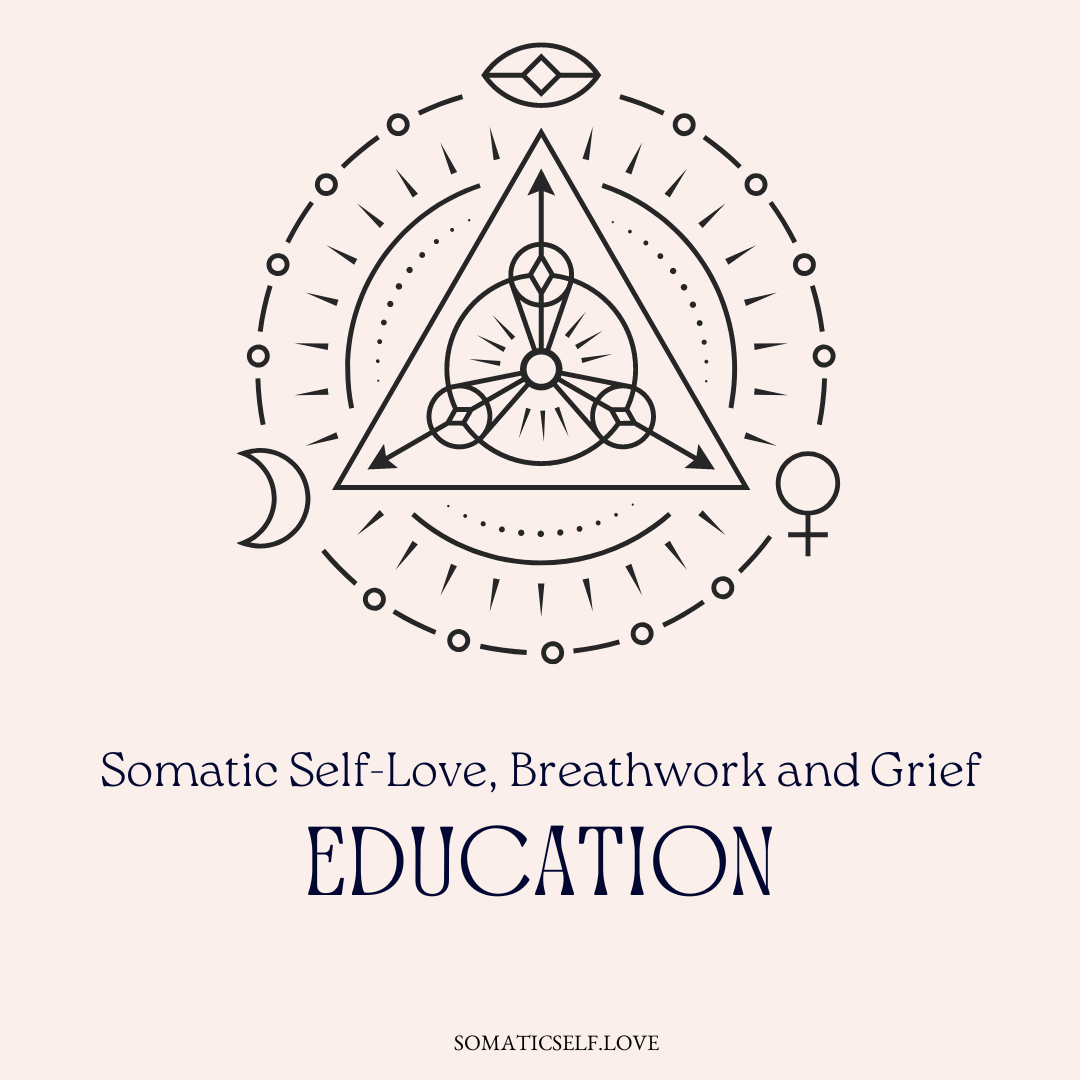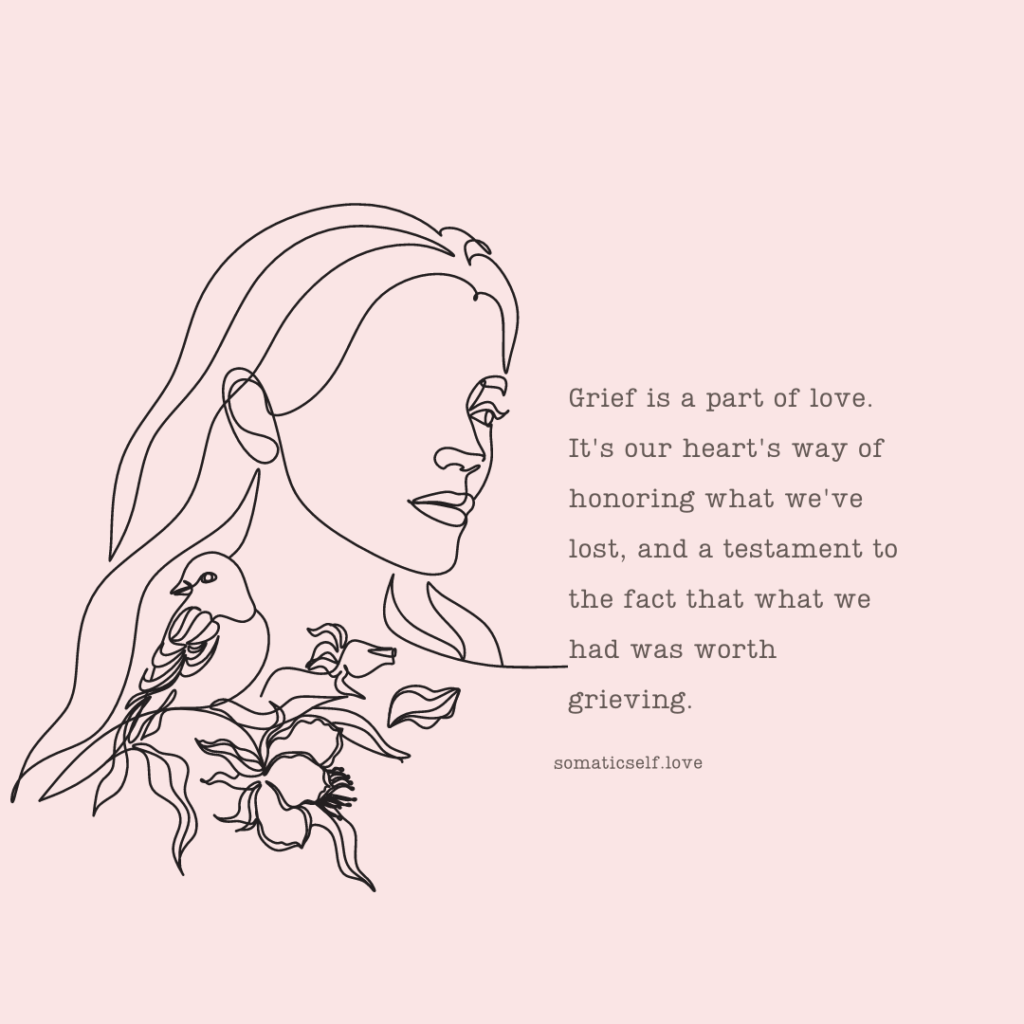Somatic Self-Love, Breathwork and Grief

In confronting loss or sudden change, we can experience an immense array of emotions – sadness, anger, remorse, and despair, to mention but a few. These feelings and sensations are potent and consuming, often leading to a state of overwhelm. In this post, learn more about grief, how it links all the facets of ourselves, and how somatic self-love and breathwork can help us navigate this natural part of life.
Understanding Grief
Grief is a complex, multi-faceted response to loss, particularly to the loss of someone or something that we loved. It’s a natural and universal part of the human experience, yet it’s also highly individual – no two people experience grief in exactly the same way.
Types of Grief
Grief can arise from various types of loss, not only from the death of a loved one. It can be a response to the loss of a relationship, a job, a home, or a significant life change like a severe illness or a global pandemic. There’s also the concept of ‘anticipatory grief’, which refers to the grief that comes before a loss when the loss is predictable, such as in cases of terminal illnesses.
Stages of Grief
One popular model for understanding grief is the Kübler-Ross model, or the ‘five stages of grief’. These stages are denial, anger, bargaining, depression, and acceptance. However, it’s important to note that not everyone will go through all these stages, which may not occur in this order. Grief is a deeply personal process, and everyone navigates it in their own way.
The Physical and Emotional Experience of Grief
Grief is both a physical and emotional experience. Physically, it might involve crying, a lack of energy, difficulty sleeping, or changes in appetite. Emotionally, it can involve feelings of sadness, anger, guilt, despair, or loneliness.

It’s also common for people in grief to experience ‘grief bursts’, where feelings of grief become suddenly intense. These feelings can be triggered by reminders of the loss, such as a song, a smell, or a date on the calendar.
And, when the pain feels too intense, our bodies might revert to ancient survival strategies — such as the collapse or freeze trauma response — to protect us from the perceived danger.
Understanding the Freeze or Collapse Response
The freeze or collapse response is a primal survival mechanism triggered when our bodies perceive a threat from which we cannot fight our way out of or run away from. It’s one of the body’s last resort — when fighting or flying isn’t possible or hasn’t worked, our bodies may freeze or collapse in an attempt to protect us. This can look like numbing, disassociation, or even a sense of paralysis.
In the context of grief, this might occur when the emotional pain is so overwhelming that our bodies perceive it as a threat. We may feel stuck, unable to move forward or even move at all.
The Impact on Grief Processing
The collapse or freeze response can complicate grief processing. While it can offer temporary relief from the intensity of grief, we’re not actually processing the grief; we’re just postponing it. This can prolong the grieving process and even lead to complicated grief or trauma.
When we are in this place, we can forget to take care of ourselves. It is here that somatic self-love brings forth a beacon of hope, a pathway to navigate the labyrinth of sorrow.
The Somatic Paradigm of Self-Love
Somatic self-love, a concept grounded in understanding our body and its inherent wisdom, goes beyond mere self-acceptance and body positivity. It entails a deeper, more visceral connection with ourselves, cultivating a sustained harmonious relationship with all of who we are – physical, emotional, spiritual, energetic, and mental aspects. In this schema of self-love, the body is seen not merely as a vessel but as an active participant in the healing process.
“Somatic self-love operates on the principle of ‘listening to the body’, acknowledging its signals, and responding to its needs with compassion and respect. It is an embodiment of self-care in the most profound sense.”
Daniella Matutes
Integration of Somatic Self-Love in the Grieving Process
In the context of grief, the integration of somatic self-love can serve as a powerful tool. It fosters a nurturing environment that aids in processing the tumultuous emotions experienced during this period. By consciously fostering self-love and feeling it alive in our bodies, we can more effectively be with sorrow and gradually add to our emotional resilience.
Understanding the Somatic Experience
To fully grasp the intertwining nature of our somatic experience and grief, it is first paramount to understand what we mean by ‘somatic experience.’
The term ‘somatic’ is derived from the Greek word ‘soma’, which pertains to the living body in its wholeness and entirety.
The term ‘somatic experience’ refers to our bodily sensations, feelings, and experiences. It encompasses everything we perceive and experience through our bodies, including physical sensations, emotional responses, and intuitive insights.
The Body-Mind Connection
Our minds and bodies are not separate but deeply intertwined. Our bodies don’t just carry out the commands of our minds; they also profoundly influence our thoughts, emotions, and behaviors.
Emotions, for example, are not just mental phenomena. They’re also physical experiences that manifest in our bodies.
When we’re anxious, our hearts may race; when we’re sad, we may feel a heaviness in our chests. These are somatic experiences – they’re ways that our bodies express and process emotions.

Grief can feel turbulent and come in waves. It’s a natural part of life that ebbs and flows.
Somatic Experience and Grief
Grief, a profound and complex emotional response to loss, often leaves indelible imprints on both our minds and bodies. These imprints can manifest as symptoms of depression, anxiety, fatigue, and even physical pain. It is here that somatic experiencing can play a pivotal role. By focusing on the physical sensations associated with grief, somatic experiencing aids in the release of pent-up emotional energy, thereby facilitating the healing process.
Now, let’s delve deeper into the interconnectedness between our somatic experience and grief:
- The Body’s Memory of Grief: Our bodies ‘remember’ grief just as our minds do. The body stores experiences, including loss or sudden change, which often leads to a range of sensations and feelings in our bodies.
- The Role of Sensation: Being aware of and naming our full somatic experience encourages us to widen our focus beyond the story of grief to the sensations occurring within our bodies. This could include a tightness in the chest, a lump in the throat, or a fluttering in the stomach. By acknowledging and experiencing these sensations without judgment, we begin to process grief.
- Grounding and Self-regulation: when we practice being with our grief this way, we open to the present moment and learn to self-regulate emotional responses. Being grounded and self-regulating can provide immediate relief from intense emotions and increase one’s capacity to cope with grief.
By focusing on the body, we start to move from a place of pain and loss to one of acceptance and healing.

Our heart is often symbolically associated with our emotions. When we say we need to “open our hearts,” we’re talking about becoming more receptive and vulnerable to our feelings, including grief. Breathwork can help us to do this.
The Benefits of Combining Somatic Self-Love and Breathwork for Grief Relief
Breathwork is the cornerstone of somatic self-love. It is a practice where we use our breath to open our hearts. When it comes to grief, breathwork is a powerful tool to help us navigate the intricate pathways of our sorrow and ultimately, open our hearts to healing.
Our heart is often symbolically associated with our emotions. When we say we need to “open our hearts,” we’re talking about becoming more receptive and vulnerable to our feelings, including grief. Breathwork can help us to do this.
Breathwork can help to “open our hearts” in a literal and figurative sense. On a physical level, deep, diaphragmatic breathing can stimulate the vagus nerve, part of our parasympathetic nervous system responsible for rest and digestion. This can help to reduce stress and promote feelings of calm and relaxation.
On an emotional level, breathwork can help us to access and release stored emotions. Breathing deeply and intentionally can bring our attention to areas of emotional tension in our bodies, and create the space for these emotions to surface and be released. Here’s more information on how this works:
Connection to the Present Moment
Breathwork helps ground us in the present moment. Grief often involves rumination about the past or anxiety about the future. The simple act of focusing on our breath can brings us back to the here and now, allowing us to experience grief in a more manageable, present-moment framework.
Release of Stored Emotions
Our bodies often hold onto emotional pain, with grief being one of the most potent. This can manifest as physical sensations, such as tightness or heaviness. Breathwork encourages the release of these stored emotions.
Expression of Grief
Breathwork can provide a safe space for expressing grief. Deep, intentional breathing can sometimes bring about emotional release, including crying, which is a natural and healing response to grief. It can help move the energy of grief through and out of the body.
Feeling Acceptance and Peace
Breathwork can promote a sense of peace and acceptance. We move from a state of avoiding or suppressing grief to acknowledging and accepting it. This is a critical step in the healing process.
Cultivates Self-Love and Compassion
Breathwork helps us to cultivate self-love and compassion, which are especially important when dealing with grief. The act of taking time to breathe and connect with our bodies is an act of self-care and kindness. It sends a signal to ourselves that we are worth this time and care.
Fosters Connection
Grief can often feel isolating. Breathwork, especially when done in a group setting, can foster a sense of connection to others. Even when practiced alone, it can help to create a feeling of connection to the universe or a higher power, which can be comforting during times of loss.
Breathwork is a valuable tool in the grief journey, but it’s important to approach it with care. It can bring up intense emotions, so it’s recommended to have support in place, such as a therapist, counselor, or supportive loved ones.
Remember, Be Gentle With Yourself
Above all, it’s important to approach yourself with kindness and compassion. Experiencing a freeze or collapse response to grief is not a failure; it’s a sign that your pain is significant, and you need support. And that’s okay. Grief is hard, and it’s okay to ask for help. You’re not alone in this.
Embrace Healing Through Breath: Somatic Self-Love Breathwork Session
Grief is a complex, multifaceted experience, often leaving us feeling both emotionally and physically drained. But imagine if you could navigate this process in a more grounded, compassionate way? Our Somatic Self-Love Breathwork session is designed to guide you towards that possibility.
Breathwork is a potent tool that connects us with our body, our emotions, and our innate capacity to heal. It invites us to listen to the wisdom of our bodies, to honor our physical and emotional responses to life, and to cultivate an intimate, compassionate relationship with our embodied selves.
By participating in this session, you’ll learn how to use breathwork to sit with your grief, to be comfortable with discomfort, and to extend compassion and understanding to your grieving self. This is a somatic process: our bodies physically respond to grief, and by acknowledging and honoring this response, we deepen our connection with our own bodily wisdom.
Sign up for our Somatic Self-Love Breathwork session today. Experience the power of breath in healing, in self-love, in being with grief. Breathe in peace, breathe out stress. Reconnect with your body, and allow your inner strength to guide your healing journey.
You are not alone in your grief. Join us and discover the empowering potential of breathwork.